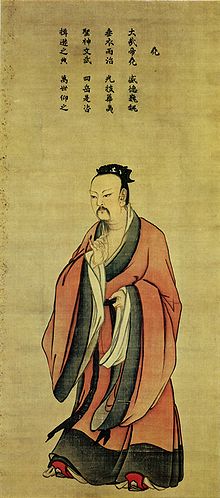- Emperor Yao
-
For other uses, see Yao (disambiguation).
Yao 
Chinese Emperor Yao. Color on silk, Song Dynasty. National Palace Museum Reign 2333 BC-2234 BC (100 years)[1] Predecessor Emperor Zhi Successor Emperor Shun Dynasty Tao Tang Born 2324 BC
Gaoyou, Jiangsu or Tianchang, AnhuiDied 2206 BC (aged 118) Yao (simplified Chinese: 尧; traditional Chinese: 堯; pinyin: Yáo; Wade–Giles: Yao), (traditionally c. 2356-2255)[2] was a legendary Chinese ruler, one of the Three Sovereigns and the Five Emperors. His ancestral name (姓)is Yi Qi (伊祁) or Qi(祁),clan name (氏)is Taotang (陶唐), given name is Fangxun(放勳) , as the second son to Emperor Ku and Qingdu (慶都). He is also known as Tang Yao (唐堯).
Often extolled as the morally perfect and smart sage-king, Yao's benevolence and diligence served as a model to future Chinese monarchs and emperors. Early Chinese often speak of Yao, Shun and Yu as historical figures, and contemporary historians believe they may represent leader-chiefs of allied tribes who established a unified and hierarchical system of government in a transition period to the patriarchal feudal society. In the Book of History, (aka the Classic of History) one of the Five Classics, the initial chapters deal with Yao, Shun, and Yu.
According to legend, Yao became the ruler at 20 and died at 119 when he passed his throne to Great Shun, to whom he gave his two daughters in marriage.
Of his many contributions, Yao is said to have invented the game of Weiqi, reportedly to favorably influence his vicious playboy son Danzhu (丹朱).[3] After the customary three year mourning period after Yao's death, Shun named Danzhu as the ruler but the people only recognized Shun as the rightful heir.
The Bamboo Annals offers a different story. Shun rebelled and imprisoned Yao where he is left to die. Danzhu is exiled and later defeated by Shun.
See also
- Chinese mythology
- Great Flood (China)
External links
Notes
- ^ According to the Records of the Grand Historian
- ^ Ching, Julia; R. W. L. Guisso (1991). Sages and filial sons: mythology and archaeology in ancient China. The Chinese University Press. p. 140. ISBN 978-9622014695. http://books.google.co.uk/books?id=ynfrlFZcUG8C&pg=PA141&dq=%22emperor+yao%22&hl=en&ei=sgPVTJ-PFsfMhAfbuoSkBQ&sa=X&oi=book_result&ct=result&resnum=2&ved=0CC0Q6AEwAQ#v=onepage&q=%22emperor%20yao%22&f=false.
- ^ Yang, Lihui; Deming An, Jessica Anderson Turner (2005). Handbook of Chinese mythology. ABC-CLIO Ltd. p. 228. ISBN 978-1576078068. http://books.google.co.uk/books?id=Wf40ofEMGzIC&pg=PA228&dq=Yao+is+said+to+have+invented+the+game+of+Weiqi&hl=en&ei=lAfVTIruBdO3hAfCuIjVBA&sa=X&oi=book_result&ct=result&resnum=3&sqi=2&ved=0CDIQ6AEwAg#v=onepage&q&f=false.
Emperor YaoRegnal titles Preceded by
ZhiEmperor of China
c. 2358 BC – c. 2258 BCSucceeded by
ShunCategories:- 24th-century BC people
- 23rd-century BC people
- Chinese mythology
- Longevity traditions
- 2324 BC births
- 2206 BC deaths
- Chinese history stubs
- Chinese people stubs
- Chinese mythology stubs
Wikimedia Foundation. 2010.
